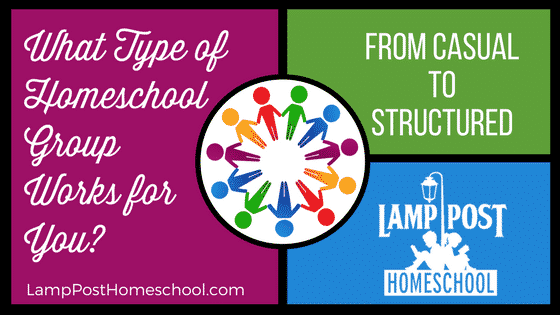Homeschool Support Groups Come in Different Shapes and Sizes
It’s important to have a support system when you are teaching your children at home, especially if you are a newbie.

It helps to have experienced friends to “be there” for you when questions about homeschooling arise or when you need some encouragement. Over the years we’ve been involved in several types of homeschool support groups.
Between Friends
You may live in an area where there isn’t a group nearby, but you should be able to find a family or two to share with. One family lived in a remote area and prayed for a long time before they found another homeschooling family who lived nearby.
New Comfy Cozy Homeschool Group
How about starting your own homeschool group? Before we moved to a new town, we subscribed by mail to the local newspaper. It just happened that one issue featured a homeschooling family. I happily read the article and looked at the photos. After we moved, we went for ice cream at the local homemade ice cream store and just happened to run into that same family! We talked and joined a few other families for a small all-volunteer homeschool group. I say all-volunteer because field trips, park days, homeschool parents meetings, and events happened because someone volunteered. One father was a pastor and volunteered his small church for meetings.
For example, one family wanted to go visit a local museum. She called the other moms and invited them to meet there at a certain time and date at a group rate. There was no pressure for anyone that way. Everything was optional and totally unstructured. When money was involved we shared the costs or donated supplies.
Larger More Formal Group
In a few years there were many more families taking up homeschooling. It became obvious that we needed some structure, places to meet, and a way to share information. That’s when someone volunteered to do a newsletter charging only for the postage. (Can you tell this was pre-internet?) Another person volunteered to be in charge of field trips. There was a phone tree to pass along urgent messages or to ask people to call their elected officials about something political relating to homeschooling. For those who wanted to, we prayed before the meetings, and it was voluntary. Most of the families were Christian, but a few weren’t.
One family arranged for us to start meeting at their larger church for gym days and some fun activities such as an art project, a speech day, or a Christmas around the world party. It was great to have a larger church with a gym, but insurance and fire regulations kicked in and made it necessary for someone to man a booth to sign in every attendee. It was easy, but the person missed being with her children for all the activities of the day.
With more people involved, some driving from nearby towns, the group started having growing pains. It used to bother me when groups split, but if you think of how cells grow and multiply, you can see it is sometimes necessary to divide in order to grow. Eventually the group split into several groups based on location, beliefs, or educational goals.
Homeschool Co-op
Some of the families wanted to share teaching through a co-op. It’s more organized and structured and usually involves setting up bylaws and a bank account. Another larger church was offered for classes once a week. Parents volunteered to teach a class for a semester or a year. Class schedules, fees, and lists of necessary books and supplies were posted on the group’s website. One parent from each family was required to volunteer to teach, babysit, or do some other job each week. The homeschool co-op works well for the families who want a more structured, academic setting for their children. It offers opportunities to form friendships with more families.
Homeschool Umbrella School
Some families have been known to put their talents to work setting up an private umbrella school under a church as a sort of hybrid homeschool. It has the legal status of a private school with the parents being designated as staff teachers. This type of school may have its own library and meeting place.
Organizations That Welcome Homeschoolers
Finally, there are organizations who welcome participation by homeschoolers. One example is our local Christian Camp. They saw an opportunity to serve homeschool families by utilizing their staff and facilities during the school year when there is no summer camping. It’s a win-win situation for everyone. Activities such as science labs, nature walks, fire safety seminars, literature classes, and more are offered once or twice a month. They even have a homeschool family camp. (Camp Susque)
Private schools may welcome homeschoolers to join their sports teams, participate in one or two classes, or attend special presentations. If a homeschool group has its own sports team, you’ll often see them playing against the private schools.
One church set up a school of the arts with music, drama, and art lessons with private teachers. It’s been a blessing to all who attend.
Which Group Do You Like?
Finding a homeschool support group is important because fellowship is good. You may have to try more than one type of homeschool group to find the one that works best for you and your children. Some families participate in more than one group and pick and choose their activities. Most homeschool support groups open some of their events to members of other groups. If your area has more than one group, it’s nice to have someone who offers to run an email message line to all the local homeschoolers. People email announcements of interest to the coordinator who periodically emails everyone on the list with the updates.
What is your favorite type of homeschool group?
Hope this helps someone today.
Blessings,
Harriet
